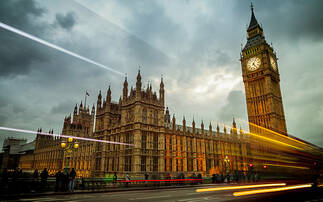David Davis is apparently 'irritated' that people fear the UK could water down environmental standards - has he really been paying so little attention?
The term 'gaslighting' has its origins in the 1944 film noir Gaslight, in which a murderous husband attempts to convince his wife she is mistaken when she notices small changes in the home that he has instigated. The term was popularised in dating circles to describe a particularly unpleasant and disorientating form of relationship power struggle where one partner seeks to destabilise the other by denying observable reality. More recently, Donald Trump's cynical and tortuous relationship with the truth saw gaslighting make the leap into the world of politics.
Today, Brexit Secretary David Davis has given less of a masterclass and more of a kindergarten class in how gaslighting works.
He told an audience of business leaders that "we will continue our track record of meeting high standards after we leave the European Union", before chastising anyone who, for whatever reason, ever doubted that this was the case. According to The Telegraph he is genuinely irritated the European Commission fears the UK could axe environmental and workers' standards post-Brexit.
"Now, I know that for one reason or another there are some people who have sought to question that these really are our intentions," he said, presumably while looking around for pearls to clutch. "They fear that Brexit could lead to an Anglo-Saxon race to the bottom. With Britain plunged into a Mad Max-style world borrowed from dystopian fiction. These fears about a race to the bottom are based on nothing, not history, not intention, nor interest."
Leaving aside the already widely pilloried point that the Brexit Secretary now appears to be setting the bar for Brexit success at the subterranean level of 'at least we won't end up with desert warlords clubbing each other to death in pursuit of the last barrel of oil'. Leaving aside the fact that while a no deal scenario where flights are grounded and trucks are stuck for hours outside of Dover is unlikely to result in a full breakdown in law and order it will result in crowds of people who probably feel more of an affinity to Mad Max than Four Weddings and Funeral. Is Davis really suggesting his audience's fears about a concerted post-Brexit weakening of UK environmental and social standards are "based on nothing"? Is he really airily dismissing the source of these fears as "one reason or another"? Really? Is this where we are at? The answer appears to be yes.
Davis' assertion the UK will continue to maintain high standards post Brexit and his insistence this position is supported across government is, of course, hugely welcome. His backing for the Paris Agreement and his recognition that "work to combat climate change... has to be done at an international level" is great to hear.
The more Ministers go on record to make such assurances the better. In the absence of an adequately robust Withdrawal Bill these rhetorical hostages to fortune are the best businesses are going to get as they work on their long term, post-Brexit plans.
But the arrogant attempt to dismiss concerns about a "race to the bottom" as completely unfounded is desperate stuff. This is gaslighting, pure and simple.
There are credible reasons why businesses and NGOs fear well established and broadly popular environmental and social standards could be axed or diluted once the UK is free of Brussels. They are the same reasons why the European Commission is briefing member states on the risk of the UK deregulating post-Brexit and mulling what trade sanctions would be justified if the EU finds itself undercut on standards by a 'Singapore on Thames'. It really doesn't take much research to uncover these reasons, although, as we all know by now Davis is not much a fan of research.
Only last week Foreign Secretary Boris Johnson hinted strongly he would be in favour of a review of environmental impact assessments that asked whether it was absolutely necessary to "monitor two life cycles of the snail or build special swimming pools for newts". If you don't recognise this as dog whistled support for environmental deregulation then you've never studied politics. Then again, if Davis remains as laid-back as his reputation suggests, perhaps he has never studied how a dog whistle speech works (an influential MP once described the Brexit Secretary to me as "so lazy he makes Cameron look hard-working", which you can file under harsh but fair).
Crucially, the Foreign Secretary is not alone in hinting at a desire for deregulation, whatever Davis says to the contrary.
International Trade Secretary Dr Liam Fox has raised the prospect of a US trade deal that would allow the import of chlorinated chicken and other products that face fierce opposition from environmentalists. Chancellor Philip Hammond has suggested that without a trade deal the UK would have to depart from the EU social model and "become something else". On the backbenches Jacob Rees Mogg, he of the increasingly influential European Research Group, has said post-Brexit the UK slash environmental standards "a very long way", on the grounds that if regulations are "good enough for India" they could be good enough for the UK.
Just to clarify things for the Brexit Secretary, the "one reason or another" that some people doubt the government's commitment to high standards is that your actual colleagues keep actually saying they would be happy with lower standards.
And on the record comments from Ministers and MPs are not even the half of it. A report this weekend from Greenpeace's Unearthed website revealed how a network of transatlantic think tanks with close links to senior ministers is working on proposals for a UK-US trade deal that would see a clear dilution of food and environmental standards.
Meanwhile, Davis' insistence that fears about deregulation are not based in history stretches credulity to breaking point. The UK has often been a positive force calling for more effective regulation in Brussels, as evidenced by its consistent demands for more ambitious emissions goals. But it is also well known that British governments of all stripes have pushed Brussels for more relaxed standards and regulations on numerous fronts. Only last year reports suggested the UK was one of the major forces demanding that several new climate-related goals be made non-binding.
These debates about the future direction of the UK's environmental policy framework has played out against a backdrop where green campaigners remain convinced the safeguards contained in the government's Withdrawal Bill are not robust enough.
Legitimate fears remain that EU environmental principles, such as polluter pays and the precautionary principle, will not help shape future UK policy, just as questions remain over how the UK will police and enforce EU rules. At the same time, anyone with knowledge of how British politics works fears a scenario where even if the UK ascribes to EU standards a massive row could quickly jeopardise everything the first time the UK breaches targets on renewables or air quality and finds itself facing legal action from Brussels. Environment Secretary Michael Gove has thankfully signalled he is keen to address these concerns, but details on how he plans to do so remain opaque and pressure on him from some Vote Leave colleagues to embrace their deregulatory zeal will only increase.
It is encouraging Davis sees no value in a race to the bottom on standards, just as it is encouraging that the EU has said any trade deal is contingent on the UK's continued adherence to environmental standards. It is good to hear him making the economic and business case for a high standards and praising the UK's key role in setting environmental guidelines and rules. But with key cabinet ministers set to gather at Chequers this week the rumour is the Prime Minister is leaning towards an opening gambit that would see the UK commit to close regulatory alignment in some areas while seeking divergence in others. Such an approach would, by definition, raise fresh questions about the long term prospects for a host of environmental regulations.
On balance the likelihood is environmental standards will broadly remain in place and could even strengthen. As polling from IPPR and Opinium confirms today, the public is overwhelmingly in favour of a high standards environment. A Hard Brexiteer government pursuing its deregulatory dream would face significant public and business opposition. But there is no reason to relax, no reason to buy Davis' insouciant insistence all will be fine.
He could have been honest. He could have said "I understand your concerns". He could have said "while we recognise some in our party, including some in government, would like to unleash a deregulatory push I side with the Prime Minister in her insistence that a high standards approach is right for the UK". He could have challenged colleagues to explain how the UK could ever hope to secure a trade deal with its largest market if it set its sights on regulatory divergence. Instead he insulted his audience by insisting there was nothing to see here, that their fears were unfounded.
As is so often the case with Brexit it is hard to tell with this dismissal of reality is a result of cynicism on Davis' part or whether he genuinely believes his own disingenous spin.
Of all the privations of Brexit - the inflation and the weakening of the pound, the division and the coarsening of public debate, the all-consuming uncertainty and the mounting fear that over a decade of public life will be consumed by this inherently high risk project - it is the insulting of our collective intelligence that grates the most.











